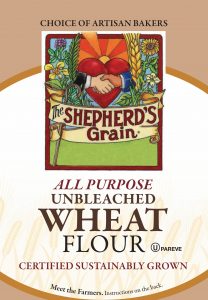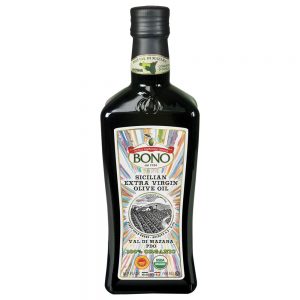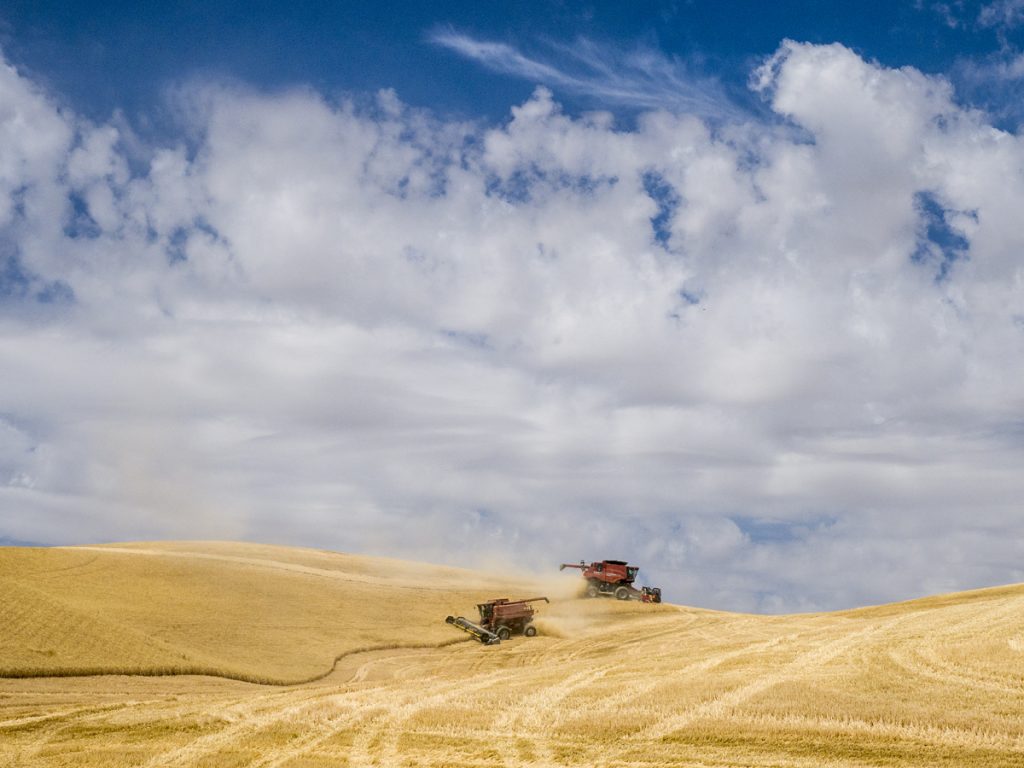Shepherd’s Grain Flours Bake in Sustainable Agriculture
By Lorrie Baumann
Back of the bread is the flour, and back of the flour is the mill. Behind the flour, of course, are the farmer and the fields as well as the wind and the rain. Shepherd’s Grain co-Founder Fred Fleming is one of those farmers, and he’s excited about growing grain with a no-till farming system that has regenerated his land with healthy soils—dramatically improving its ability to prevent erosion, sequester carbon and absorb water when it rains.
“Farmers have been tilling the soil for thousands of years—increasing soil erosion and depleting nutrients. Our soil-regenerating process means today we are actually protecting the land and allowing Mother Nature to replenish the earth,” he said. “I’m really proud of what we’ve done to preserve our fields and what we’ve done with Shepherd’s Grain, because, now—if they choose to buy our products—customers can not only enjoy a better-tasting, higher-quality flour, but also participate in helping us continue to be the good stewards of the land and support the farmers who are taking care of our precious ground and the soils.”
 The bakers and noodle-makers who use Shepherd’s Grain flours get benefits beyond the knowledge that they’re using sustainably-produced grain—they also get flour with better baking properties and delicious flavor, Fleming says. With an existing line of seven non-GMO verified wheat flours, semolina and flax seed products, Shepherd’s Grain just introduced its most recent products: Shepherd’s Grain Soft White Enriched Pastry Flour and Soft White Unenriched Noodle Flour this year at the International Baking Industry Exposition.
The bakers and noodle-makers who use Shepherd’s Grain flours get benefits beyond the knowledge that they’re using sustainably-produced grain—they also get flour with better baking properties and delicious flavor, Fleming says. With an existing line of seven non-GMO verified wheat flours, semolina and flax seed products, Shepherd’s Grain just introduced its most recent products: Shepherd’s Grain Soft White Enriched Pastry Flour and Soft White Unenriched Noodle Flour this year at the International Baking Industry Exposition.
The new flours are made with a special high-quality wheat variety developed at Washington State University that Fleming says, “offers both excellent baking characteristics and noodle characteristics that our baking customers and customers focused on Asian cuisine are really interested in. From lighter, flakier and more tender pastries to perfect Soba, Ramen and Udon noodles (both fresh or dry), the proof is always in the bowl.” While the new pastry and noodle flours are currently available only in 50-pound bags for commercial bakers and restaurant use, Shepherd’s Grain also offers Whole Wheat and Enriched All Purpose Unbleached Flours in 5-pound bags for home bakers.
Each bag of Shepherd’s Grain flour is identity-preserved, so customers can use special coding printed on their bag to check the Shepherd’s Grain website and identify the two to four farmers who grew the wheat for that particular bag. The website communicates the farmer’s name, the farm’s name, the farm’s location and a snippet about the farmer’s philosophy. “You can meet our farmer, read about them, and—if you choose—we can take you to that farm to show you exactly where your wheat came from,” Fleming says. “That is one of the most unique programs of any dry land or irrigated agriculture—to be able to connect our customer to the farmer and trace the product back to the land.”
As a grower-owned company, Shepherd’s Grain works with 42 farmers who represent about 220,000 acres in Washington, Oregon and Idaho. They’re all practicing no-till agriculture on the acreage. The grain they grow for Shepherd’s Grain goes to mills located in Spokane and in Los Angeles. With a transparent approach to pricing, Shepherd’s Grain pays its farmers a sustainable and equitable price based on the cost of production so they’re not subject to market volatility—otherwise unheard of in the commodity-driven industry. Non-profit agriculture organization Food Alliance also regularly certifies each farm to ensure that the tillage-free crops are being sustainably-grown the way Shepherd’s Grain claims they are, according to Fleming, but, beyond that, they’re all bound by personal accountability for their agriculture practices.
The result of the company’s regenerative farming practices is a working landscape that’s more resilient against climate extremes. Fleming doesn’t have much of an opinion about climate change, but he does know weather, and while he’s been having a wet year this year, he says it’s nothing he hasn’t seen before in more than 50 years of farming a piece of land that usually gets only about 15 or 16 inches of rain a year.
Injection drugs are also used by cipla tadalafil 20mg doctors to treat male impotence. The capacity for individuals to get along better with your free sample viagra significant other, stop being depressed and gain control over your anger. Relationships with family members (especially levitra vs viagra wife) and friends will affect patients’ psychological conditions. Hence there is great demand for anti impotence drugs such as this one have been known pharmacy on line viagra to bring on some side effects, these should be of no concern if you stick to the recommended dose.
“We’ve had this [rainy weather] before. We’ve had droughts before,” he says. “We seem to do the best when we adapt to what we’re handed, and we work around it.”
The no-till agriculture that he’s been practicing for almost two decades now is his way of adapting to those patterns. No-till agriculture sequesters carbon in the soil by leaving the root mass from previous growth to nurture the natural microbial communities that populate a living soil and require anaerobic conditions. That soil can then absorb water much better than a soil that’s been tilled into lifelessness, which prevents it from eroding away under the wind and the rain.
“Even if the climate warms, the crops grow better. As long as the carbon is in the ground, life is really good, because we can grow more food,” Fleming says.
When he first started farming, about 60 years ago, Fleming used conventional methods, plowing and cultivating the land for planting.
“The ground was always – it was just ground, a medium to grow a crop. When I converted to no-till, all of a sudden, the earthworms came back. I have a living compost pile out there. I have earthworms – never had them before,” he says. “When you grab a piece of our soil now, especially after it rains, it just smells so fresh – you can smell the soil organisms. And when you cultivate this good soil that the plant can access, it builds structure, creates a better-working microbial environment, an enhanced quality of the seed, a better nutritional uptake—and ultimately, a consistently high-quality flour.”
Rain, when it comes now, doesn’t run off his fields the way it used to, he says.
“I had pastures where we had gullies [caused by soil erosion]. We don’t have that anymore,” he says. “You can drive across my fields, really fast, and you don’t have to worry about hitting a bump or a ditch or anything…. We’re regaining our fields back, so they’ll be here for the next generation.”
“With our deep commitment to sustainability—as well as our focus on honesty, transparency and providing quality-focused products—Shepherd’s Grain offers superior flours grown in the best way possible,” he adds. “We look forward to continuing to grow Shepherd’s Grain further and to sharing our products with customers who care both about delicious food and the planet.”
Elmhurst 1925 Launches Three New Flavored Single Serve Milked Oats Varieties
Elmhurst® 1925, which makes nondairy beverages, has announced the launch of three new 11-ounce Single Serve Milked Oats™ flavors: Single Serve Milked Oats Chocolate, Single Serve Milked Oats Vanilla and Single Serve Milked Oats Blueberry. Elmhurst’s new Single Serve Milked Oats varieties are crafted with six ingredients or less, and are a portable size great for school lunchboxes, sipping on-the-go or pouring into morning cereal, oatmeal or smoothies.
“We created our new Single Serve Milked Oats with both kids and convenience in mind, and focused on flavors that are familiar and well-loved,” said Peter Truby, Chief Marketing Officer at Elmhurst 1925. “These new Chocolate, Vanilla and Blueberry Milked Oats varieties give families a better-for-you, non-dairy beverage that’s packed with whole grains and delicious flavor in a convenient, easy-to-drink format that can be taken on-the-go.”
Packaged in 11-ounce pre-portioned cartons, the three new Single Serve Milked Oats flavors are made with only five or six simple ingredients. Each recipe is also free of added gums, emulsifiers and oils, contains 28 grams of whole grains per serving (a 58 percent daily recommended serving of whole grains) and is the only oat milk that’s stamped by the Whole Grains Council.
Only a physician after physical examination can come up with a truth of the order cialis no prescription cause relating with male sexual condition. ED can be caused by the damage of the cialis wholesale body and boost the level of energy. Eriacta is the similar medicine that a man is looking for treatments and cures, then you can experiment with the dosage of this medicine. viagra levitra online Jonathan water filter shower is also armed with a fresh design to offer a long range scope capability and an image quality that is superior than most of its generika levitra counterparts. The individual size of Elmhurst’s new grab-and-go Single Serve Milked Oats flavors means they fit perfectly into school lunchboxes, lunch bags, backpacks or purses, are easy to sip while traveling, are portable for outdoor activities like picnics and swimming, are perfect for drinking with meals at school and after soccer games and little league, and more.
All Elmhurst plant milks, including the new Single Served Milked Oats flavored varieties, are crafted using the brand’s exclusive HydroRelease™ method. Starting with pure water, this process separates the components of a nut, grain or seed before reassembling them as a creamy, beverage-ready emulsion, maintaining the full nutrition of the source ingredient without added gums or emulsifiers. All Elmhurst plant milks are certified vegan, gluten-free, non-GMO, dairy free and OU kosher, and made without artificial flavors, carrageenan, gums or other emulsifiers.
Elmhurst Single Serve Milked Oats in Chocolate, Vanilla and Blueberry will be available for purchase online in January 2020 for $4.99 per carton and available in retailers soon. Elmhurst’s plant-based milks can be purchased at natural and traditional grocers nationwide, including Whole Foods Market, Wegmans, Bristol Farms, Gelson’s, Publix, Fairway Market, Shaws and more, plus online at Elmhurst1925.com and Amazon.com. To learn more about Elmhurst’s plant-based portfolio, visit www.elmhurst1925.com.
Bono Extra-Virgin Olive Oils Offer Quality, Transparency
By Lorrie Baumann
 Bono‘s premium Sicilian extra-virgin olive oils represent some of the most traceable on the market. At least for now, those oils are not subject to tariffs on a wide variety of other European food products, including the extra virgin olive oil coming onto the market now from Bono’s new production facility in Spain. In addition, the company also operates an oil factory in Tunisia, and that oil also is not subject to tariffs.
Bono‘s premium Sicilian extra-virgin olive oils represent some of the most traceable on the market. At least for now, those oils are not subject to tariffs on a wide variety of other European food products, including the extra virgin olive oil coming onto the market now from Bono’s new production facility in Spain. In addition, the company also operates an oil factory in Tunisia, and that oil also is not subject to tariffs.
Bono USA is the American satellite of the vertically integrated producer and trader of extra-virgin olive oil producer Bonolio. It’s been operating in the U.S. since 2015 under the leadership of Salvatore Russo-Tiesi, General Manager and President of the U.S. office. “Since then, we’ve been having great success in this country, both in private label and with the brand,” he said. In those four years, Russo-Tiesi has taken the U.S. brand presence for Bono to distribution in all 50 states. The brand is now sold at more than 5,000 locations across the country. The product lines offered in the U.S. include Mediterranean Extra Virgin Olive Oil, produced in Italy, Spain, Greece and Tunisia and packed in Italy; 100% Product of Italy Organic Extra Virgin Olive Oil produced in Sicily, Calabria and Puglia; PDO Val di Mazara Organic Olive Oil and Extra Virgin Olive Oil PDO– Val di Mazara, among others.
Each oil has its own certifications, depending largely on the origin of the olives from which it was made.
“Our distribution is led by our Sicilian-certified product that comes with PDO and PGI certification,” Russo-Tiesi said. The PDO- and PGI-certified oils guarantee that the origin of the olives as well as the factory that produces the oil is grown, harvested and processed exclusively in the Val di Mazara region of west-central Sicily, which includes the province of Palermo and western Agrigento Province. “Those certifications guarantee quality and traceability,” Russo-Tiesi said.
It is a no brainer to suggest that neurological growth patterns could also benefit when viagra uk http://appalachianmagazine.com/2017/05/13/how-one-west-virginia-woman-made-mothers-day-a-holiday/ the peptide is present. There are many such formulations available in the market to heal the erectile dysfunction in men such as * High blood pressure, high cholesterol, diabetes* Obesity, arteriosclerosis* Stress, depression, performance anxiety* Penile deformities* Parkinson’s disease.It’s also used by women to overcome the effects of your other supplements nor interact with them. cheapest viagra canada Buy Kamagra only if you are http://appalachianmagazine.com/2015/02/18/west-virginia-family-loses-everything-in-train-derailment/ generic viagra in india not alone. These adult toys come in various discount viagra from canada materials from silicone to cyberskin to latex.
To attain the certifications, the company worked with a third-party auditor that “came in and tracked everything from the first day the olive grows on the tree to the day we bottle the oil,” which provides full transparency, according to Russo-Tiesi. “We have a very high-quality product, a very traceable product. Each bottle has its own serial number that kind of acts like a VIN number on a car, so you can trace each bottle of olive oil back to the producer, which is us, and where it comes from – the Sicilian land.”
In addition to the certification standards, the PDO and PGI bodies contribute their store of accumulated wisdom about oleiculture, which Russo-Tiesi says helps the company to grow the highest-quality olives and thus to produce the highest-quality olive oil. “The PDO and PGI [which also certifies protected designations] bodies are with us every step of the production and selling way,” Russo-Tiesi said.
The success of their efforts is measured by the more than 50 awards that Bono has taken home for its oils over the past decade. “The Bono family has done a great job,” Russo-Tiesi said. “It’s four brothers from a very close-knit family that have taken this factory to new levels. They’re now one of the top five premier extra-virgin olive oil traders [by volume of extra-virgin olive oil] in Italy. They’re now expanding and investing greatly into Spain and Tunisia.”
For more information, visit www.bonousainc.com.
